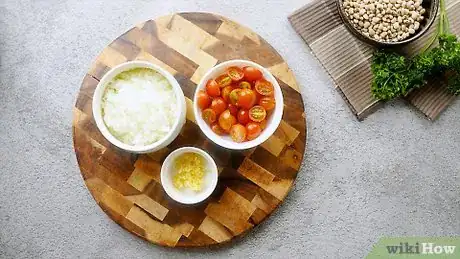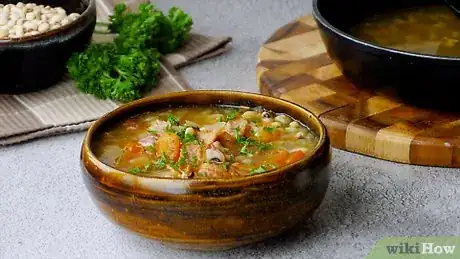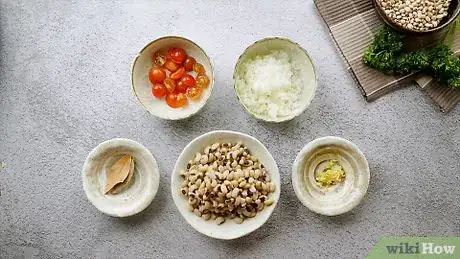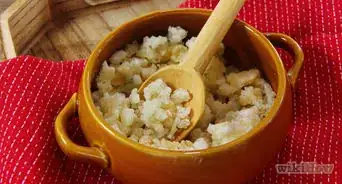wikiHow is a “wiki,” similar to Wikipedia, which means that many of our articles are co-written by multiple authors. To create this article, 13 people, some anonymous, worked to edit and improve it over time.
The wikiHow Culinary Team also followed the article's instructions and verified that they work.
This article has been viewed 295,835 times.
Learn more...
Black-eyed peas are a symbol of good luck and are considered a traditional course to have on New Year's Day, especially in the southern United States. Here is one traditional method of preparing black-eyed peas.
Ingredients
Makes 8 servings.
- 1 lb (450 g) dry black-eyed peas
- 2 cups (450 ml) chopped cooked ham
- 2 onions
- 4 plum tomatoes
- 1 clove garlic
- Salt and pepper, to taste
- 1 Tbsp (15 ml) vegetable oil
- 4 cups (1 liter) water
- 2 bay leaves
Steps
Soaking the Beans
-
1Rinse the beans. Place the black-eyed peas in a colander and rinse them with cool running water.
- Rinsing the black-eyed peas removes dirt and stray hulls.
-
2Place the beans in a pot of cold water. Make sure that the water covers the black-eyed peas completely, but do not fill the pot so high that it will boil over when heated. Cover with the lid of the pot.Advertisement
-
3Boil the water. Heat the beans and water over medium-high heat until the water reaches a steady boil. Continue boiling for 2 to 3 minutes.
- Most beans are soaked in cold water for several hours, but black-eyed peas can be soaked in hot water to reduce the amount of time it takes.[1]
- It is not essential to soak your black-eyed peas, so this step can be skipped if you are short on time. Soaking the beans causes them to become softer, however, and it also helps to reduce the risk of digestive upset.
-
4Let stand. Allow the black-eyed peas to sit in the warm water for 60 to 90 minutes.
-
5Drain and rinse. Pour the contents of the pot through a colander to remove the stale water. Rinse the black-eyed peas once more with cool water.
Preparing the Other Ingredients
-
1Select the best type of ham. For the most traditional flavor, use salty country ham.
- Black-eyed peas can technically be prepared using nothing more than salt and water. The taste of the beans can be rather dull on their own, however, and it is more traditional to prepare them with pork and certain vegetables.
- Smoked ham steak makes a good choice when cooking black-eyed peas using the alternative slow cooker method. A ham bone works, as well.
- Use a sweetened ham, like a honey-baked ham, if you want a sweeter taste.
- Bacon or pancetta are also popular choices to use when preparing black-eyed peas.
-
2Chop the vegetables. The vegetables should be chopped into small pieces with a sharp kitchen knife.
- Give the onions a rough chop until the pieces are roughly 1/2 inch (1.25 cm) in size. Use a tangier variety, like a white onion or yellow onion, for a heartier taste. Use a sweet onion variety, like a Vidalia onion, for a milder, sweeter taste. You could also use 1/4 cup (120 ml) dried minced onion flakes instead of the whole onions to save time.
- Dice the tomatoes into 1/2 inch (1.25 cm) chunks, saving the juice. To save time, you can also use a 12-oz (375 ml) can of diced tomatoes. For a spicier twist, select a can a diced tomatoes with chopped green chili peppers.[2]
- Place the garlic on your cutting board with the broad, dull side of the knife blade held against it. Carefully yet forcefully smack the knife down to break open the garlic and remove the skin. The garlic can be used this way, or you can also mince the garlic into fine pieces with a knife. Alternatively, you can use 1/4 tsp (1.25 ml) of garlic powder, instead.
-
3Heat up the ham in oil. Heat the oil in a large stockpot over medium-high heat. Add the ham and cook for 4 minutes or until the edges begin to crisp up, stirring frequently.
- This step is only optional. You can prepare the beans without crisping up the pork first.
Cooking the Beans
-
1Stir the beans into the ham. Add the pre-soaked black-eyed peas to the same stockpot you used to cook the ham. Stir the beans into the ham to coat with the flavored grease.[3]
-
2Add the onion, tomatoes, garlic, and bay leaves. Stir the ingredients together until thoroughly mixed.
-
3Fill with 4 cups (1 liter) of water. Use cold water.
- There should be just enough water to cover the beans and vegetables, and the water level should not extend past three-quarters of the stockpot's height. The 4-cup (1-liter) measurement is merely an estimate.
- If you did not pre-soak the beans, you will need to use twice as much water.
-
4Cover and boil. Place the cover over the stockpot and heat the contents of the pot over medium-high to high heat, until the water begins to boil. Cook for 10 minutes.
- Leave the lid slightly ajar to allow steam to escape slowly. Doing so relieves pressure inside the pot, lessening the odds of the water boiling over and creating a mess.
-
5Reduce heat and cook slowly, adding more water as necessary. Turn the heat down to medium so that the rapid boil slows to a steady simmer. Cook for an additional 1 to 2 hours.
- You may not need to add more water. If the water level dips below the black-eyed peas, though, add another 1 cup (250 ml) of warm water.
- Once the beans are done, they should have a soft, creamy taste, and the juice should be flavorful rather than watery. If the beans lose their shape, however, they have been overcooked.
- Taste the beans after the first hour. If they are not done, continue checking every half hour after that.
-
6Add salt and pepper, if desired. After the beans have finished cooking, remove the stockpot from the heat and add any salt and pepper you want. Stir the beans to thoroughly incorporate the salt and pepper.
- Roughly 1/4 tsp (1.25 ml) of black pepper should suffice, but you can add more or less depending on how hot you prefer things.
- If you used salted ham, additional salt may not be necessary. For low-sodium hams, however, you may wish to add 1/4 tsp (1.25 ml) or so.
-
7Discard the bay leaves and serve. Fish out the bay leaves before pouring the beans into individual serving dishes using a ladle.
- Consider serving these black-eyed peas with cornmeal dumplings for a Southern classic.
Alternative Cooking Method
-
1Prepare the ingredients as usual. Soak the black-eyed peas and chop up the vegetables.
-
2Add the ingredients to the slow cooker. Toss the black-eyed peas, tomatoes, onions, garlic, ham, and bay leaves into the slow cooker. Add salt and pepper, if desired. Cover and cook on high for 90 minutes[4] or on low for 3 hours.
-
3Throw out the bay leaves and serve. Turn off the slow cooker and dig out the bay leaves. Serve the black-eyed peas while still hot.
Community Q&A
-
QuestionI cooked them all day long in a slow cooker, but they came out tough. What did I do wrong?
 Community AnswerThe slow cooker won't get hot enough to penetrate the dried bean. Instead, use the stove top method. Soak them overnight, then cook them low and slow for 2-4 hours. You can also use good smoked meat for seasoning and chicken stock instead of plain water. Black eyed peas are very starchy, so the stock thickens up nicely.
Community AnswerThe slow cooker won't get hot enough to penetrate the dried bean. Instead, use the stove top method. Soak them overnight, then cook them low and slow for 2-4 hours. You can also use good smoked meat for seasoning and chicken stock instead of plain water. Black eyed peas are very starchy, so the stock thickens up nicely. -
QuestionCan I cook black eyed peas with rice?
 Community AnswerYes, you can.
Community AnswerYes, you can.
Things You'll Need
- Large stockpot with lid
- Colander
- Sharp knife
- Heat-resistant flat spatula
- Ladle or serving spoon
References
- ↑ http://www.drweil.com/drw/u/ART03210/Cooking-With-Legumes-Black-Eyed-Peas.html
- ↑ http://www.foodnetwork.com/recipes/paula-deen/spicy-black-eyed-peas-recipe/index.html
- ↑ http://hilahcooking.com/how-to-cook-black-eyed-peas/
- ↑ http://www.skinnytaste.com/2010/09/slow-cooked-black-eyed-peas-with-ham.html
About This Article
Before you cook black-eyed peas, place them in a colander and rinse them with cool water to remove any dirt. Fry about 2 cups of chopped ham in a little hot oil, then stir the beans into the ham. Next, add chopped onions, tomatoes, garlic, and bay leaves to the pan and stir the ingredients together. Pour about 4 cups of cold water over the beans, then cover the pot and boil for 10 minutes. Reduce the heat and cook for another 1-2 hours. After the beans are cooked, add salt and pepper to taste. Keep reading to learn how to soak your black-eyed peas to soften them!






















































